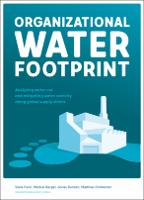Organizational water footprint
Analyzing water use and mitigating water scarcity along global supply chains
Author(s)
Forin, Silvia
Berger, Markus
Bunsen, Jonas
Finkbeiner, Matthias
Language
EnglishAbstract
Freshwater is a vital resource for humans and ecosystems but is scarce in many regions around the world. Organizations measure and manage direct water use at their premises but usually neglect the indirect water use associated with global supply chains – even though the latter can be higher by several orders of magnitude. As of 2015, there was no standardized life-cycle-based approach for analysing the water consumption of an organization. Against this background, the BMBF funded research project “Water Footprint for Organizations – Local Measures in Global Supply Chains (WELLE)” has been launched by TU Berlin, Evonik, German Copper Institute, Neoperl, thinkstep and Volkswagen. The project aims to support organizations in determining their complete Organizational Water Footprint, identifying local hotspots in global supply chains and taking action to reduce their water use and mitigate water stress at critical basins. Within the WELLE project a method for analysing an Organizational Water Footprint has been developed, which analyses an organization’s water use and resulting local impacts throughout its entire value chain. In other words, the Organizational Water Footprint considers not only the direct water use at production facilities, but also the water used indirectly for energy generation and raw material production (upstream in the supply chain) as well as water use during the use and end-of-life phases of products (downstream). The Organizational Water Footprint method builds on two environmental assessment frameworks which have been identified as suitable for the purpose of this project: Water Footprint (ISO 14046, 2014 and Organizational Life Cycle Assessment (UNEP 2015). To support stakeholders in conducting Organizational Water Footprint studies, this guidance document was developed, which presents the method in a clear and concise way by illustrating each step with a practical example. By analysing their Water Footprints, organizations can determine water use and resulting local impacts at premises and “beyond the fence” along global supply chains. In this way they can reduce water risks and contribute to a more sustainable use of the world’s limited freshwater resources.
Keywords
water footprint; organizational water footprint; water use; global supply chainsDOI
10.14279/depositonce-11818ISBN
9783798331242, 9783798331242Publisher website
https://verlag.tu-berlin.de/Publication date and place
Berlin, 2021Classification
Sustainability
Pollution control


 Download
Download Web Shop
Web Shop